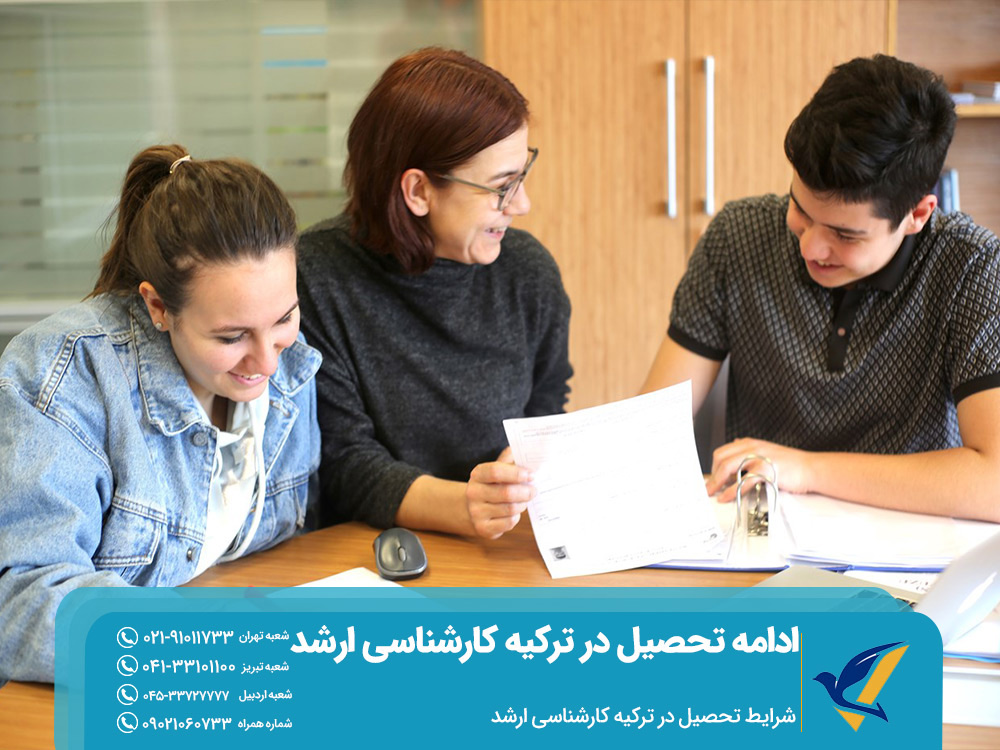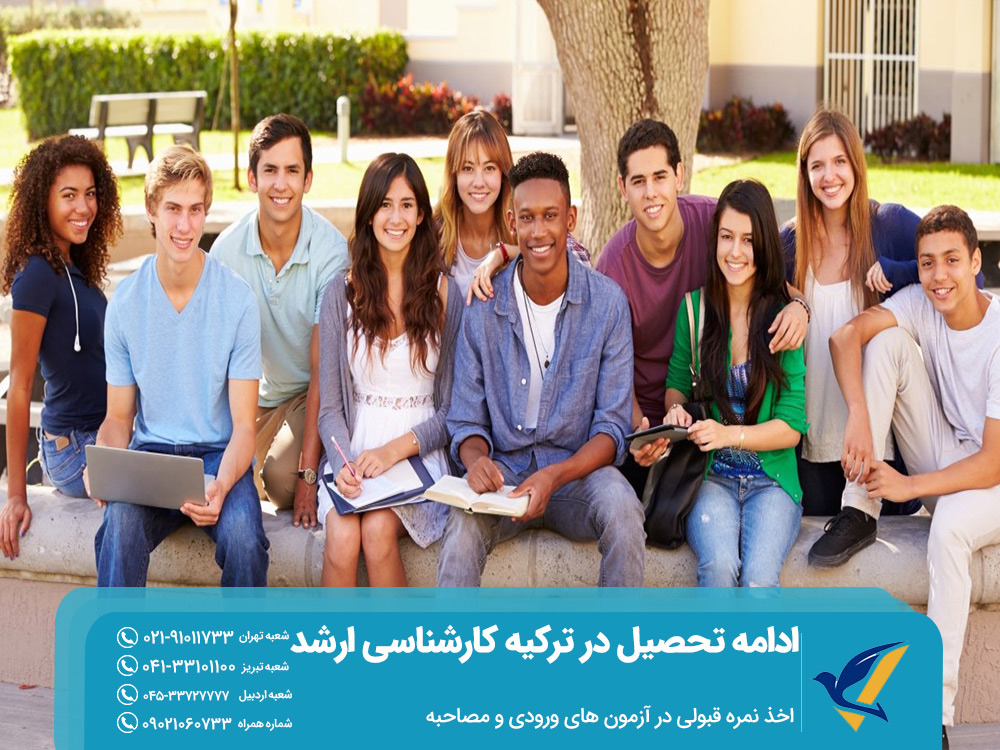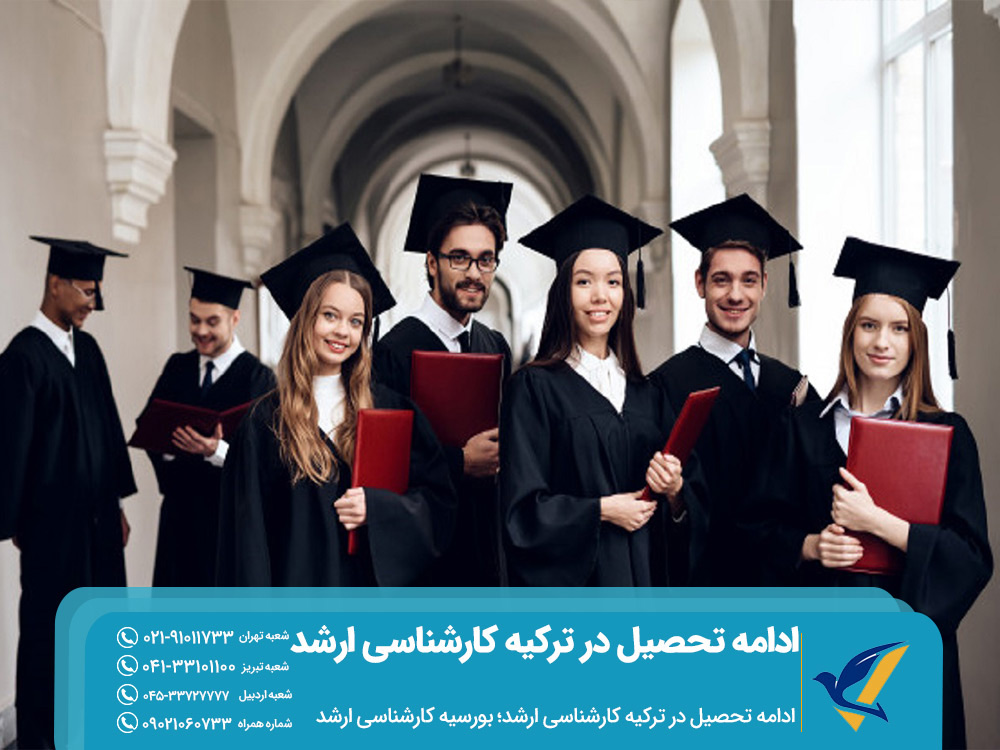Continuing Education in Turkey: Master’s Degree + 2025 Requirements
The presence of reputable universities, diverse academic programs, and affordable tuition fees have made Turkey a popular destination for many international students, including Iranians. Universities in this country rank among the top universities worldwide, offering remarkable performance in terms of education quality, facilities, and opportunities. Continuing education at the master’s level in Turkey attracts the highest number of applicants compared to other academic levels. Most master’s students seek to obtain a recognized international degree and pursue pathways for migration to European countries and the USA.
The Turkish master’s scholarship is awarded based on students’ resumes, qualifications, and expertise, covering tuition fees, educational expenses, and accommodation costs. One of the conditions for studying for a master’s degree in Turkey is passing entrance exams required by some universities, such as ALES, GRE, and GMAT. In this article, part of the series by Elm Vira Immigration Institute, we thoroughly review the requirements and necessary documents for pursuing a master’s degree in Turkey.
Continuing Education in Turkey: Master’s Degree
The master’s degree program in Turkey has the highest demand compared to other academic levels, making admission more competitive. These programs are offered in both English and Turkish. Tuition fees vary depending on the field of study, university, and language of instruction. Generally, most programs offered by public universities in Turkey are taught in Turkish, and studying in this language is more cost-effective.
Turkey is a member of the Bologna Process, allowing graduates to continue their education in European universities without the need for diploma equivalency. Continuing education in Turkey facilitates educational migration pathways to Europe and the USA. The duration of master’s programs in Turkey is a maximum of 2 years, depending on the student’s field of study. Each master’s student must complete 120 credit hours during their studies.
Another advantage of pursuing a master’s degree in Turkey is the possibility of working while studying. International master’s students are allowed to work up to 20 hours per week during their studies. Additionally, students with strong resumes and high academic performance can benefit from Turkish master’s scholarships, which help reduce tuition and living expenses.
There is no age limit for enrolling in master’s programs; however, for scholarship eligibility, applicants must be under 30 years old.

Requirements for Studying for a Master’s Degree in Turkey
Continuing education at the master’s level in Turkey for international students involves specific conditions and requirements. By fulfilling these, students can have a successful academic experience in the country. The key requirements for pursuing a master’s degree in Turkey include the following:
1. Submission of Required Documents for Master’s Studies in Turkey
The documents needed for admission to master’s programs in Turkish universities are not the same across all institutions; each university requires a specific set of documents. It is also important to note that admission conditions differ for international and Turkish students. Applicants should carefully visit the official website of their desired university and prepare the requested documents thoroughly. The general documents required for admission to master’s programs in Turkey include:
- A valid bachelor’s degree from a recognized university
- Complete and official transcripts from the undergraduate program
- Official translation of documents into Turkish or English
- Original and copy of passport
- Academic, research, and work-related resume
- Statement of purpose (motivation letter)
- Two or three recommendation letters from professors or previous employers
- Completed application forms for the chosen university
- Proof of financial ability (financial support documents)
2. Language Proficiency for Master’s Studies in Turkey
Most master’s programs at public universities in Turkey are taught in Turkish, with only a small number offered in English. Therefore, if you want to study at public universities at a lower cost, you must provide proof of Turkish language proficiency or enroll in Turkish language courses. English-language programs are primarily available at private universities. To study English in Turkey, students need to achieve acceptable scores in English language tests such as IELTS (minimum 6.0) or TOEFL (minimum 80).

3. Passing Entrance Exams and Interviews
For some master’s programs such as management and engineering, passing specific entrance exams is required. Exams like ALES, GRE, GMAT, etc., play a significant role in university admissions, and high scores can strongly influence your acceptance. Some universities may also conduct interviews as part of their admission process. Therefore, it is essential to check the specific requirements of each university when applying for a master’s degree in Turkey.
Top Universities for Master’s Studies in Turkey
Turkey is one of the popular destinations for international students pursuing a master’s degree. Turkish universities hold a notable position in global rankings and offer high-quality education. These universities provide international students with opportunities to improve their skills and award degrees recognized worldwide. Below is a list of some of the top universities for master’s studies in Turkey:
University NameTypeGlobal Ranking
Koç University Private 477
Sabancı University Private 531–540
Bilkent University Private 561–570
Middle East Technical University (METU) Public 501–510
Boğaziçi University Public 701–750
Istanbul Technical University Public 601–650
Hacettepe University Public 801–1000
These universities are among the most prestigious institutions in Turkey offering master’s programs. Other universities also provide master’s degrees. Deciding on your field of study and university requires careful research and consideration. The following fields have the highest admission rates in master’s programs in Turkish universities:
- Financial Management
- Business Administration
- Tourism Industry
- International Trade
- Chemistry
- Medicine
- Dentistry
- Psychology
- Architecture Engineering
- Civil Engineering
- Computer Engineering

Master’s Studies in Turkey: Scholarships for Master’s Degree
Tuition fees for master’s programs at public universities in Turkey are generally between $5,000 and $20,000 less than those at private universities. Studying for a master’s degree in Turkish is also less expensive than studying in English. Tuition for a Turkish-taught master’s program ranges from approximately $500 to $1,000 per year, while for English-taught programs, international students typically pay between $1,500 and $3,500 per year.
Although the tuition fees for master’s studies in Turkey are quite affordable, the Turkish government and some universities offer various scholarships to support outstanding students, facilitate international education, and promote national development. These scholarships are granted to top students with strong academic records and high scientific capabilities. However, master’s scholarships in Turkey usually do not cover all expenses; they typically cover part of the tuition fees and sometimes include benefits such as accommodation and health insurance. Scholarships are awarded based on the candidate’s specialty and qualifications.
Applicants for master’s scholarships in Turkey generally must be under 30 years old and achieve top scores in university entrance exams such as the GMAT. Notable scholarship programs include TUBITAK Scholarships and Turkey Scholarships (Türkiye Bursları).
Master’s Entrance Exams in Turkey
A crucial step for admission to master’s programs and for obtaining scholarships in Turkey is taking the relevant entrance exams required by universities. Some universities require exams such as ALES, GRE, GMAT, and language proficiency tests in Turkish or English. The most important entrance exams include:
- ALES (Academic Personnel and Graduate Education Entrance Exam):
- A vital exam in Turkey that tests candidates’ language proficiency and specialized knowledge. The ALES certificate is essential for master’s admissions and is valid for two years.
- GRE (Graduate Record Examination):
- An internationally recognized exam conducted by ETS, covering verbal and quantitative skills. GRE scores are accepted for master’s admissions in Turkey.
- GMAT (Graduate Management Admission Test):
- A well-known test used globally to evaluate analytical, writing, quantitative, verbal, and reading skills, especially for management, finance, economics, MBA programs, and scholarship applications.
- TÖMER Exam:
- A language proficiency test designed to assess candidates’ Turkish language skills, is required for admission to Turkish-taught graduate programs.

Master’s Studies in Turkey and Obtaining Residency
One of the common ways to obtain residency in Turkey is through studying at universities in the country. International students have up to three weeks after arrival to apply for a student residence permit. If a student fails to apply within this period, their stay will be considered illegal, and they may face deportation.
International master’s and doctoral students in Turkey are permitted to work up to 20 hours per week during their studies. After graduation, students can apply for a work permit by finding a suitable job. One of the fastest paths to permanent residency in Turkey for master’s graduates is through obtaining a work permit. Graduates must apply for their work permit within six months after completing their studies.
Another condition for permanent residency after graduation is legally residing in Turkey for a total of eight years. It is important to note that student residence years count as half of this requirement.
Summary
In recent years, master’s studies in Turkey have gained significant popularity among international students seeking graduate education. The tuition fees and living costs in Turkey are generally lower compared to many other countries, while the degrees awarded hold high international recognition without the need for grade normalization.
Master’s scholarships in Turkey do not cover all expenses; they usually provide partial support for tuition, accommodation, and insurance costs. Therefore, studying for a master’s degree in Turkey is not entirely free. Entrance exams and valid language certificates are essential requirements for admission.
If you are looking for an easier pathway to migrate to Europe or the USA with an internationally recognized degree, Turkish universities can be an excellent choice.
You can register at top universities in Turkey with the support of consultants from the Elm Vira Immigration Institute and benefit from scholarships and financial aid. For more information about studying abroad and to receive a free consultation, please visit the consultation section.
میانگین امتیازات 5 از 5
Vote count: 1 Vote